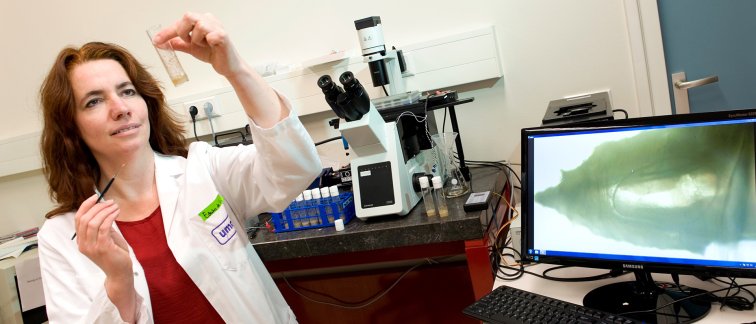The most common cardiac arrhythmia, AF, is difficult to diagnose and treat, due to the lack of knowledge on the molecular mechanisms driving AF. Current AF treatments are based on ‘one-size-fits all’ and don’t prevent progression from recurrent intermittent episodes to permanent AF. Adding to these difficulties, it is challenging to determine the stage of AF. Therefore, AF progresses in time causing a tremendous physical, psychological, societal and economic burden.
Causes and treatment of AF
There are multiple causes for AF: ageing, lifestyle-related changes in the cardiomyocytes and genetic causes. Molecular mechanisms of AF are studied by Brundel's group and explain part of the electrical arrythmic changes in AF. Brundel's team identified that bio-electrical dysfunction drives AF, i.e. atrial tissue damage-induced electrical and contractile dysfunction. This research led to discovery of blood-based biomarkers, advancing the diagnosis of AF. Moreover, these molecular mechanisms have initiated new treatment approaches, which have so far been succesfull in AF models. Drugs used in these new treatment approaches are already on the market for other indications, making clinical trials within reach. The Atrial Fibrillation Innovation Platform (AFIP), a foundation co-founded by Bianca Brundel, has already tested some of these drugs in patients.
By utilizing citizen science, patients identified already five leading triggers for AF. Together with patients, researchers and health professionals, the CIRCULAR consortium aims to further explore these triggers. Moreover, experimental research is directed at building the molecular human AF atlas, which serves new (high-throughput) drug discovery and biomarker research. By co-creation with patients, novel treatments are tested in clinical trials. The approach is unique, as it combines animal-free advanced systems and circular research for patient tailored solutions.
CIRCULAR consortium
The ambition of the CIRCULAR consortium is to reduce the AF burden by testing how (toxic) triggers for AF result in molecular and electrical dysfunction and drive AF. This will be tested in co-creation with people with lived-experience in AF and innovative animal-free technologies. Findings are utilised to discover effective treatments and diagnostics. Hereto, AFIP foundation serves to co-create science and solutions with people with lived-experience in AF, researchers, and health professionals.
In the CIRCULAR consortium, public as well as private partners are working together. The grant which funded the CIRCULAR consortium, Dutch Research Agenda programme Research along Routes by Consortia (NWA-ORC), is particularly meant to stimulate public-private partnerships and interdisciplinary research. In total, the NWA-ORC has awarded a total of 149 million euros, 131 million euros of which contributed by NWO and 18 million euros by local and international consortium partners.
Source: NWO

